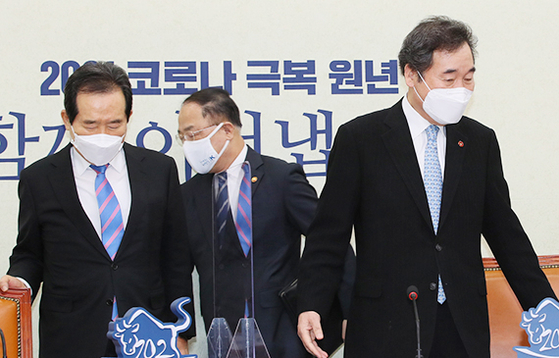Prime Minister Jeong Sye-gyun, Deputy Prime Minister Hong Nam-ki and Minister of Strategy and Finance, and Lee Nak-yeon, together with Democratic Party representative (from left), are attending the second high-ranking party government meeting held at the National Assembly on the 28th. Reporter Woo Sang-jo
– The controversy over equity is intensifying over the 4th disaster support fund worth 20 trillion won. The question is, is it justified that the benefits will be given to college students who are not directly related to Corona 19 and those who have not paid taxes properly?
Discrimination pointed out because minor children are excluded
Self-employed, dissatisfied with including street vendors
“Support even if we don’t pay tax, we’re only hogu”
Criticism of “action of political calculation law, not economy”
– The party, the government, and the government decided to prepare an additional budget this week to support the 4th disaster support fund at a meeting held at the National Assembly on the afternoon of the 28th with Democratic Party Representative Lee Nak-yeon, Prime Minister Jeong Sye-gyun, and Blue House Policy Director Kim Sang-jo attended.
Representative Lee Nak-yeon said, “It seems that two million newcomers will be added among those who have not been eligible for support until now.” He explained that “special employment workers, freelance workers, and corporate taxi drivers are newly included in the payment target.” “We are able to provide special work scholarships to college students who have difficulties due to their parents’ unemployment or closure.”
However, there are voices of criticism that it is justifiable to pay disaster subsidies to college students on the basis of their parents’ unemployment or closure. Most of these are adults who can be self-reliant, and they are not the class that has been directly hit by Corona 19, such as declining sales and profits.
In particular, their parents are self-employed who are unemployed or closed from business and receive a disaster subsidy, so they can be doubled, and unemployed or closed-off families with minor children are excluded from additional support, which may lead to a controversy about discrimination. It is the background of the saying that it was aimed at the vote of university students with voting rights ahead of the by-election in April.
Other self-employed people are strongly opposed to the inclusion of street vendors in the 4th disaster subsidy. This is because it is difficult for them to report reduced income or objectively identify sales. In the Internet community of self-employed people, “I’m the boss because I’m sick”, “We are Hogu, who pay all the taxes.” “I can’t understand the policy to support those who don’t pay the tax properly.” “Is it only the tickets of street vendors are valuable?” Responses such as ”come up.
Kim Mo (36), who runs a restaurant in Seoul, argued, “The street vendors are not well equipped with a card payment system, so their annual sales are low, and accordingly, they have been classified as a simple business and have received benefits such as exemption from VAT.” He added, “It is absurd to say that the government supports the Amon people, although the government should provide relief for self-employed persons who do business officially within the system.
There are also complaints from payers who are’glass wallets’. This is because there are not a few cases where the income of the salaried workers has decreased as the company they attend has become difficult due to Corona 19.
In the Internet community that many office workers visit, there is a buzz about’the self-employed, freelancers, and corporate taxi drivers are not the only ones who have been damaged, so why should I support them with my taxes?’
Tae-gi Kim, professor of economics at Dankook University, said, “Disaster subsidies are determined not by economic grounds, but by’political calculations’,” he said. “If the backlash against equity increases, it can lead to controversy beyond criticism of wasting blood taxes.”
Reporters Hae-Yong Hae and Ji-Hye Kim [email protected] ![]()
–


